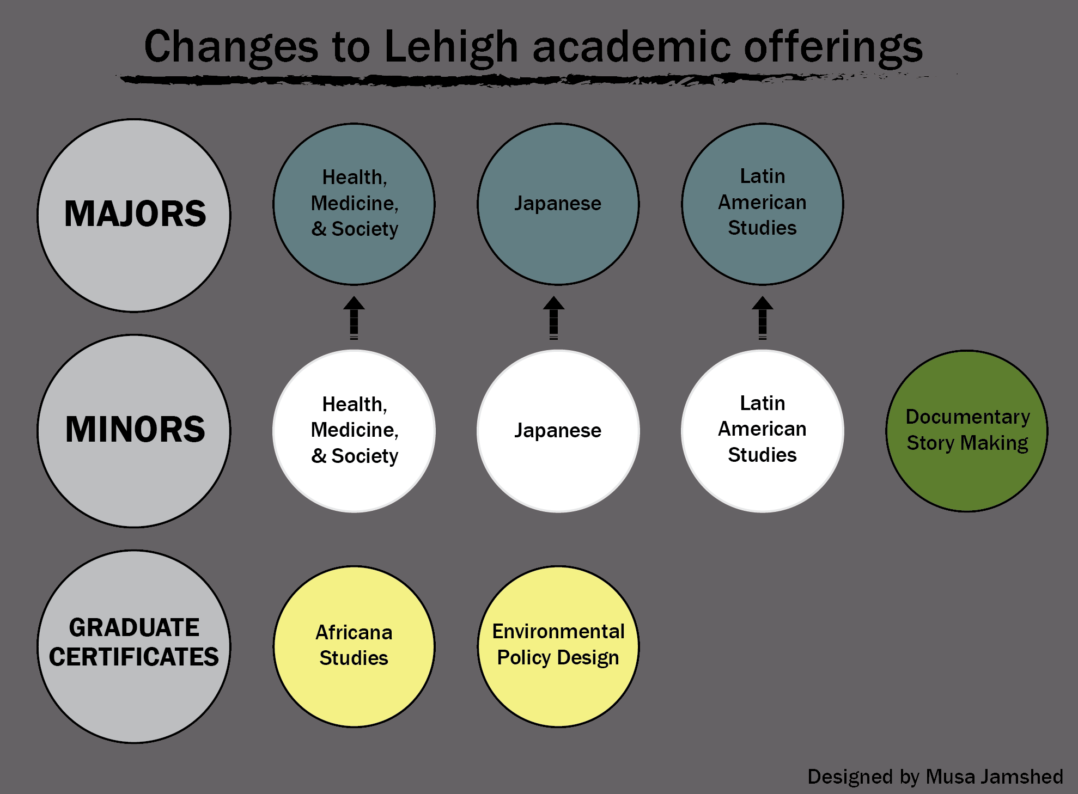
A number of minor programs have been expanded into majors this year.
Among the minors that are now available as majors are health, medicine, and society (HMS), Japanese and Latin American studies with an added component of Latino studies. Documentary story making is now an available minor.
The directors of these programs each had different reasons for making the switch and see different advantages in creating these new opportunities for students.
“(Implementing these sorts of programs) makes Lehigh more of a global and well-rounded place,” said Kiri Lee, a professor and director of Asian studies. “I think it is very exciting for the Lehigh students to have these opportunities to study these uncommonly taught topics.”
On top of modifications to undergraduate programs, Africana studies and environmental policy design are now available as graduate certificate programs.
The environmental policy graduate certificate, which acts as a minor for graduate students, was created to add an element of formality to a student’s focus area.
Karen Pooley, the director of the environmental policy design program, said, for example, a bioengineer who is interested in conservation can earn an environmental policy certificate to show this interest to potential employers.
Some minor programs like HMS were turned into majors due to an increase in student demand. Jessecae Marsh, the director of the HMS program, said as soon as she had the number of professors and course approval to implement a major program, students began declaring HMS as their majors. However, the program requires a double major.
On Friday, the HMS program held an information session about the new major. Delilah Hsu, ’19, decided to turn her minor into a major.
“I was originally a pre-med major, but switched to psychology, so I thought this would be a good track because I still wanted to study health,” Hsu said.
While the process of creating these programs is exciting for the directors, it takes a lot of effort and dedication. There are many checkpoints prior to each program’s approval.
Matt Bush, the director of the Latin American and the Latino studies program, said in addition to handling the normal obstacles when implementing a new major, such as the determining the number of required credit hours, he had to start an entirely new section of study.
Originally, Latin American studies was offered as a minor. Now that it is a major, they added the Latino studies component which did not previously exist.
“With Latino Studies, we are also talking about Hispanic cultures within the United States, so that’s really the big transition,” Bush said.
One of the greatest challenges for the interdisciplinary programs, in addition to making sure the curricula are rigorous enough, is to make sure they are not relying too much on other programs.
“Because so many things are cross-listed, we have to make sure the other departments are on board when we move to the major,” Marsh said. “So far though, other departments are extremely supportive of the HMS major.”
While the environmental policy graduate certificate program also has the challenges of an interdisciplinary program, Pooley said it is difficult to describe exactly what it is and what it can offer to students.
“This is really thinking about the policies that surround how we interact with the built-in natural environment,” Pooley said.
The directors expect an increase in enrollment as more students begin to understand what these new programs offer and the opportunities they can provide.





Comment policy
Comments posted to The Brown and White website are reviewed by a moderator before being approved. Incendiary speech or harassing language, including comments targeted at individuals, may be deemed unacceptable and not published. Spam and other soliciting will also be declined.
The Brown and White also reserves the right to not publish entirely anonymous comments.